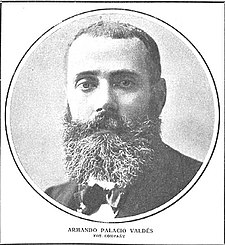fiction.wikisort.org - Writer
Armando Palacio Valdés (4 October 1853 – 29 January 1938) was a Spanish novelist and critic.
Biography
Armando Francisco Bonifacio Palacio y Rodríguez-Valdés was born at Entralgo in the province of Asturias on 4 October 1853, eldest son of Silverio Palacio y Cárcaba, a lawyer, and Eduarda Rodríguez-Valdés y Alas, a aristocrat. His brothers, Atanasio and Leopoldo, also were writers.
His first writings were printed in the Revista Europea. These were pungent essays, remarkable for independent judgment and refined humour, and found so much favor with the public that the young beginner was soon appointed editor of the Revista. The best of his critical work is collected in Los Oradores del Ateneo (1878), Los Novelistas españoles (1878), Nuevo viaje al Parnaso and La Literatura en 1881 (1882), this last being written in collaboration with Leopoldo Alas.[1]
In 1881 he published a novel, El señorito Octavio, which shows an uncommon power of observation, and the optimistic promise of better things to come. In Marta y Maria (1883), a portrayal of the struggle between religious vocation and earthly passion, somewhat in the manner of Valera, Palacio Valdés achieved a popular triumph.[1]
According to a contemporaneous assessment by James Fitzmaurice-Kelly in the Encyclopædia Britannica Eleventh Edition:
El Idilio de un enfermo (1884), a most interesting fragment of autobiography, has scarcely met with the recognition which it deserves: perhaps because the pathos of the story is too unadorned. The publication of Peredas Sotileza is doubtless responsible for the conception of José (1885), in which Palacio Valdés gives a realistic picture of the manners and customs of seafaring folk, creates the two convincing characters whom he names José and Leonarda, and embellishes the whole with passages of animated description barely inferior to the finest penned by Pereda himself. The emotional imagination of the writer expressed itself anew in the charming story Riverita (1886), one of whose attractive characters develops into the heroine of Maximina (1887); and from Maximina, in its turn, is taken the novice who figures as a professed nun among the personages of La Hermana San Sulpicio (1889), in which the love-passages between Zeferino Sanjurjo and Gloria Bermúdez are set off with elaborate, romantic descriptions of Seville. El Cuarto poder (1888) is, as its name implies, concerned with the details, not always edifying, of journalistic life. Two novels issued in 1892, La Espuma and La Fe, were enthusiastically praised in foreign countries, but in Spain their reception was cold ... Subsequently Palacio Valdés returned to his earlier and better manner in Los Majos de Cádiz (1896) and in La Alegría del Capitán Ribot (1899). In these novels, and still more in Tristán, ó el pesimismo (1906), he frees himself from the reproach of undue submission to French influences. In any case he takes a prominent place in modern Spanish literature as a keen analyst of emotion and a sympathetic, delicate, humorous observer.[1]
A collection of his short stories appeared in English translation in 1935.
Works
![Marta y María, by Amado González Hevia [es], known as Favila](http://upload.wikimedia.org/wikipedia/commons/thumb/a/a5/Marta_y_Mar%C3%ADa%2C_Favila%2C_1999.JPG/275px-Marta_y_Mar%C3%ADa%2C_Favila%2C_1999.JPG)
- Semblanzas literarias (1871)
- Los oradores del Ateneo (1878)
- El nuevo viaje al Parnaso (1879)
- La literatura en (1881), with Leopoldo Alas
- El señorito Octavio (1881)
- Marta y María (1883)
- Aguas fuertes (1884)
- El idilio de un enfermo (1884)
- José (1885)
- Riverita (1886)
- Maximina (1887)
- El cuarto poder (1888)
- La hermana San Sulpicio (1889)
- La espuma (1890)
- La espuma (1891)
- La fe (1892)
- El maestrante (1893)
- El Orígen del Pensamiento(1893)
- Los majos de Cádiz (1896)
- La alegría del capitán Ribot (1899) ("The Joy of Captain Ribot", 1900)
- Tristán o el pesimismo (1906)
- La aldea perdida (1911)
- Los papeles del doctor Angélico (1911)
- Años de juventud del doctor Angélico (1918)
- La novela de un novelista (1921)
- Cuentos escogidos (1923)
- La hija de Natalia (1924)
- El pájaro en la nieve y otros cuentos (1925)
- Santa Rogelia (1926)
- Los cármenes de Granada (1927)
- Testamento literario (1929)
- Sinfonía pastoral (1930)
- El gobierno de las mujeres (1931)
- Obras completas (1935)
- Álbum de un viejo (1940)
- El Crimen en Calle de la Perseguida (Unknown)
See also
In English
- Literary realism: General vision of the movement
- Spanish literature: Evolution of Spanish literature
In Spanish
- wikisource:es:Armando Palacio Valdés
- es:Literatura española del Realismo
References
- One or more of the preceding sentences incorporates text from a publication now in the public domain: Fitzmaurice-Kelly, James (1911). "Palacio Valdés, Armando". In Chisholm, Hugh (ed.). Encyclopædia Britannica. Vol. 2 (11th ed.). Cambridge University Press. pp. 22–523.
- Diccionario de literatura española. Madrid: Revista de Occidente, 1964.
External links
- Works by Armando Palacio Valdés at Project Gutenberg
- Works by or about Armando Palacio Valdés at Internet Archive
- Works by Armando Palacio Valdés at LibriVox (public domain audiobooks)

На других языках
- [en] Armando Palacio Valdés
[ru] Паласио Вальдес, Армандо
Армандо Паласио Вальдес (исп. Armando Palacio Valdés; 4 октября 1853 года, Лавьяна, — 29 января 1938 года, Мадрид) — испанский писатель и литературный критик, один из крупнейших представителей реализма в испанской литературе во второй половине XIX века.Другой контент может иметь иную лицензию. Перед использованием материалов сайта WikiSort.org внимательно изучите правила лицензирования конкретных элементов наполнения сайта.
WikiSort.org - проект по пересортировке и дополнению контента Википедии
